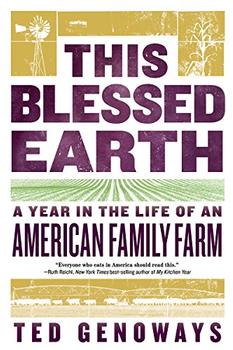Summary | Excerpt | Reviews | Beyond the Book | Readalikes | Genres & Themes | Author Bio

A Year in the Life of an American Family Farm
by Ted GenowaysPrologue
READYING THE BIN
September 2014
The last yellow hues of evening were fading to blue. A bright circle of sun blazing through an uncapped vent in the roof had climbed the corrugated side of the grain bin and smoldered out like an ember. Now the only remaining light, there in the dark interior, was the flame of Kyle Galloway's cutting torch—first a flickering orange tongue, then as he adjusted the hissing valve, a bright cerulean cone of fire. Sparks showered and bounced across the concrete slab as he cut another steel plank down to size.
Still in his twenties, Kyle was broad-chested, with dark, buzz-cut hair and a gentle round face and glasses that gave him a kindly, almost child-like air. But he moved through his work with quiet authority, inching across the width of the plank until the unwanted end clanked on the concrete. Kyle paused a beat to let the fresh cut cool, then he laid the plank into place, the next piece in a floor now nearly half done, and stomped it again and again with his heel. Each boot fall roared loud as thunder, shaking the whole structure, until the section snapped tight. Kyle stepped up, bouncing to test its soundness. Then, satisfied, he leaned through the open portal door.
Outside, in the gathering dark, Dave Tyson, the farm's hired man, handed over the next section of floor. Dave wore a ball cap and round glasses of his own. Easily twenty years Kyle's senior, he seemed to be making a conscious show of keeping pace. The sleeves of his flannel shirt were torn off, and the last of the summer heat formed a film of sweat on his pale biceps, the muscles tensing and flexing as he hoisted the flooring. Salvaged from an older bin on a distant part of the acreage, these planks had been laid up in a defunct hog shed for years. But nothing ever goes wholly to waste on the farm. Old tractors and field trucks, hay rakes and a faded harvester all stood tucked away in leaning barns or grown over by tall grass at the edge of a shelterbelt, dormant but awaiting purpose. For this flooring, it was finally here.
At the end of June 2014, crop counters at the U.S. Depart- ment of Agriculture had released estimates that the summer's mild weather and increased rainfall would mean a much-higher-than-expected yield. It's the kind of prediction that sounds like good news, but for farmers it meant an upcoming glut of grain. One report projected that the national soy-bean yield would be 3.3 million acres higher than expected at planting—not just cutting into profits but actually outstripping domestic demand. The outlook for corn was little better. Though acres planted to feed corn were down, the stockpiled reserves from the record yield of 2013 remained at an all-time high. On news of such unprecedented surpluses, corn and soybean futures nosedived among speculators at the Chicago Board of Trade. After several years of riding high on $8 corn, farmers watched prices fall to $3.50 per bushel. Soybeans, which had topped $17, dropped below $10.
Then in August, in the weeks just before harvest, a series of downpours moved across the middle of Nebraska, dumping two and three inches of rain at a time, pushing back the start date for bringing in the beans. While Kyle and Dave waited anxiously for fields to dry enough that a harvester wouldn't mire in the mud, projections for the national yield kept going up and up. Every day that the crops stayed out, unharvested and undelivered to the co-op, the per-bushel prices went lower. For weeks in nearby towns, at the firehouse in Hordville and the bar in Polk, even at the Iron Skillet at the truck stop south of York, the talk had turned to the Jews in Chicago making bank on the backs of farmers. Kyle didn't have time for that. He rolled his eyes and shook his head at old-timers who were drinking coffee and bullshitting instead of doing what they could to cut their losses.
Excerpted from This Blessed Earth by Ted Genoways. Copyright © 2017 by Ted Genoways. Excerpted by permission of W.W. Norton & Company. All rights reserved. No part of this excerpt may be reproduced or reprinted without permission in writing from the publisher.
Be sincere, be brief, be seated
Click Here to find out who said this, as well as discovering other famous literary quotes!
Your guide toexceptional books
BookBrowse seeks out and recommends the best in contemporary fiction and nonfiction—books that not only engage and entertain but also deepen our understanding of ourselves and the world around us.